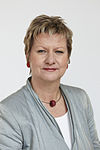Background
Germany's largest state has often been described as a bellwether in recent years. [1] [2] The SPD governed continuously from 1966 until a CDU–FDP coalition took control in the 2005 state election. This defeat led Chancellor Gerhard Schröder to call a federal election, which he lost.
In the 2010 state election, the CDU held a 0.1% lead over the SPD, though both parties won 67 seats. The SPD and Greens emerged one seat short of a majority, while the CDU and FDP were 10 seats short. This was due to the new presence of The Left. After failed negotiations with The Left, the SPD and Greens formed a minority government with SPD leader Hannelore Kraft as Minister-President. [3] The state budget was rejected by the Landtag on 14 March 2012. [3] [4] The government expected the FDP to abstain from the vote, allowing it to pass. [5] However, the CDU, FDP, and Left all voted against the budget, and it was rejected. [4] This led to the dissolution of the Landtag and a snap election.
Election result
There was a major swing from the CDU to the SPD and to the Pirates, who entered their fourth state parliament in a row. The Greens stayed essentially level, while the FDP bucked the national trend, achieving a 2-point swing in their favour. This was attributed to the popular leadership of Christian Lindner. [7] Lindner was elected FDP federal leader one year later, after their historic defeat in the 2013 German federal election. The Left lost over half their voteshare and lost their seats after just two years in the Landtag.
The SPD won a landslide in the direct mandates, winning 99 seats to the CDU's 29. This led to a large number of overhang seats for the SPD and leveling seats for other parties, increasing the size of the Landtag from 181 to 237 seats.
State CDU leader Norbert Röttgen resigned, but refused to become leader of the opposition in the Landtag of North Rhine-Westphalia, instead continuing to serve as Minister for the Environment. Because of that, in what was considered unceremonious and highly unusual move (ministers are normally given the courtesy of resigning by themselves even after scandals), Chancellor Merkel fired him under Article 64 of the German Basic Law three days after the election.
|
|---|
| Party | Constituency | Party list | Total
seats | +/– |
|---|
| Votes | % | +/– | Seats | Votes | % | +/– | Seats |
|---|
| Social Democratic Party (SPD) | 3,290,561 | 42.29 | +3.79 | 99 | 3,049,983 | 39.13 | +4.65 | 0 | 99 | +32 |
| Christian Democratic Union (CDU) | 2,545,309 | 32.71 | –5.83 | 29 | 2,050,321 | 26.31 | –8.25 | 38 | 67 | ±0 |
| Alliance 90/The Greens (GRÜNE) | 723,581 | 9.30 | –0.84 | 0 | 884,298 | 11.35 | –0.78 | 29 | 29 | +6 |
| Free Democratic Party (FDP) | 372,727 | 4.79 | +0.09 | 0 | 670,082 | 8.60 | +1.87 | 22 | 22 | +9 |
| Pirate Party Germany (Piraten) | 617,926 | 7.94 | +7.03 | 0 | 609,176 | 7.82 | +6.26 | 20 | 20 | +20 |
| The Left (LINKE) | 201,637 | 2.59 | –2.77 | 0 | 194,428 | 2.49 | –3.12 | 0 | 0 | –11 |
| Citizens' Movement pro NRW (Pro NRW) | | 118,326 | 1.52 | +0.14 | 0 | 0 | ±0 |
| Human Environment Animal Protection Party (Tierschutzpartei) | | 58,091 | 0.75 | +0.13 | 0 | 0 | ±0 |
| National Democratic Party (NPD) | | 40,007 | 0.51 | –0.20 | 0 | 0 | ±0 |
| Family Party of Germany (FAMILIE) | 1,722 | 0.02 | –0.09 | 0 | 33,793 | 0.43 | +0.02 | 0 | 0 | ±0 |
| Die PARTEI | 6,362 | 0.08 | +0.07 | 0 | 22,915 | 0.29 | +0.17 | 0 | 0 | ±0 |
| Free Voters (FW) | 10,600 | 0.14 | New | 0 | 17,970 | 0.23 | New | 0 | 0 | New |
| Alliance for Innovation and Justice (BIG) | | 10,694 | 0.14 | –0.04 | 0 | 0 | ±0 |
| Party for Labour, Environment and Family (AUF) | 2,726 | 0.04 | +0.01 | 0 | 10,217 | 0.13 | +0.06 | 0 | 0 | ±0 |
| Free Citizens Initiative/Free Voters (FBI) | 1,538 | 0.02 | +0.01 | 0 | 9,496 | 0.12 | +0.03 | 0 | 0 | ±0 |
| Ecological Democratic Party (ÖDP) | 1,336 | 0.02 | –0.02 | 0 | 7,842 | 0.10 | ±0.00 | 0 | 0 | ±0 |
| Party of Reason (Vernunft) | | 6,356 | 0.08 | New | 0 | 0 | New |
| From now – Alliance for Germany | 1,087 | 0.01 | –0.01 | 0 | | 0 | ±0 |
| Pensioners' Party (RRP) | 418 | 0.01 | –0.08 | 0 | | 0 | ±0 |
| Civil Rights Movement Solidarity (BüSo) | 272 | 0.00 | –0.09 | 0 | | 0 | ±0 |
| Liberal Democrats (LD) | 120 | 0.00 | ±0.00 | 0 | | 0 | ±0 |
| League for All-Germany (BGD) | 83 | 0.00 | ±0.00 | 0 | | 0 | ±0 |
| Independents | 2,605 | 0.03 | ±0.00 | 0 | | 0 | ±0 |
| Total | 7,780,610 | 100.00 | – | 128 | 7,793,995 | 100.00 | – | 109 | 237 | +56 |
|
| Valid votes | 7,780,610 | 98.47 | | 7,793,995 | 98.64 | | |
|---|
| Invalid/blank votes | 120,658 | 1.53 | | 107,273 | 1.36 | | |
|---|
| Total votes | 7,901,268 | 100.00 | | 7,901,268 | 100.00 | | |
|---|
| Registered voters/turnout | 13,262,049 | 59.58 | | 13,262,049 | 59.58 | | |
|---|
| Source: |

The Free Democratic Party is a liberal political party in Germany.

The 2000 North Rhine-Westphalia state election was held on 14 May 2000 to elect the 13th Landtag of North Rhine-Westphalia. The outgoing government was a coalition of the Social Democratic Party (SPD) and The Greens led by Minister-President Wolfgang Clement.

Armin Laschet is a German politician who served as Minister President of North Rhine-Westphalia from 27 June 2017 to 26 October 2021. He served as Leader of the Christian Democratic Union (CDU) from 22 January 2021 to 31 January 2022. He was elected to the German Bundestag following the 2021 German federal election.

The 2005 North Rhine-Westphalia state election was held on 22 May 2005 to elect the 14th Landtag of North Rhine-Westphalia. The outgoing government was a coalition of the Social Democratic Party (SPD) and The Greens led by Minister-President Peer Steinbrück.

Federal elections were held in Germany on 18 September 2005 to elect the members of the 16th Bundestag. The snap election was called after the government's defeat in the North Rhine-Westphalia state election, which caused them to intentionally lose a motion of confidence to trigger an early federal election. The outgoing government was a coalition of the centre-left Social Democratic Party of Germany (SPD) and Alliance 90/The Greens, led by federal Chancellor Gerhard Schröder. The election was originally intended for the autumn of 2006.
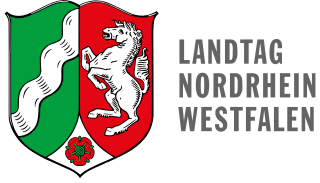
The Landtag of North Rhine-Westphalia is the state parliament (Landtag) of the German federal state of North Rhine-Westphalia, which convenes in the state capital of Düsseldorf, in the eastern part of the district of Hafen. The parliament is the central legislative body in the political system of North Rhine-Westphalia. In addition to passing of laws, its most important tasks are the election of the Minister-President of the state and the administration of the government. The current government is a coalition of the CDU and the Greens, supporting the cabinet of Minister-President Hendrik Wüst since June 2022.

The Second Merkel cabinet was the Government of the Federal Republic of Germany during the 17th legislative session of the Bundestag. Installed after the 2009 federal election, it left office on 17 December 2013. It was preceded by the first Merkel cabinet and succeeded by the third Merkel cabinet. Led by Chancellor Angela Merkel, it was supported by a coalition of the Christian Democratic Union (CDU), the Christian Social Union of Bavaria (CSU), and the Free Democratic Party (FDP).

Norbert Alois Röttgen is a German lawyer and politician of the Christian Democratic Union (CDU). He was Federal Minister for Environment, Nature Conservation and Nuclear Safety in the government of Chancellor Angela Merkel from 2009 to May 2012. From 2014 to 2021, he was Chair of the Bundestag Foreign Affairs Committee.
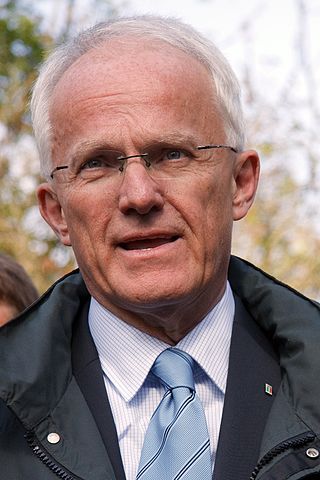
The 2010 North Rhine-Westphalia state election was held on 9 May 2010 to elect the 15th Landtag of North Rhine-Westphalia. The outgoing government was a coalition of the Christian Democratic Union (CDU) and Free Democratic Party (FDP) led by Minister-President Jürgen Rüttgers.

Hannelore Kraft is a German politician. She served as the Minister-President of North Rhine-Westphalia from 2010 until 2017. Kraft was the first woman to serve as head of government of this state and was the third woman to become head of a state government in Germany. Between 1 November 2010 and 31 October 2011, she was the President of the Bundesrat, again the first woman to hold the office. She is the former leader of the SPD North Rhine-Westphalia and served on the SPD's federal executive from November 2009 until May 2017, and was one of the four federal deputy chairs.

The 1995 North Rhine-Westphalia state election was held on 14 May 1995 to elect the 12th Landtag of North Rhine-Westphalia. The outgoing government was a majority of the Social Democratic Party (SPD), led by Minister-President Johannes Rau.

Ralf Jäger is a German politician. He is a member of the SPD. Since 2000 he has been an MP of the Landtag, the parliament of North Rhine-Westphalia. Between 2010 and 2017 he served as Minister for Interior and Local Government of North Rhine-Westphalia, in the cabinet of Minister-President Hannelore Kraft. In 2014 he was chairman of the Standing Conference of Interior Ministers in Germany.
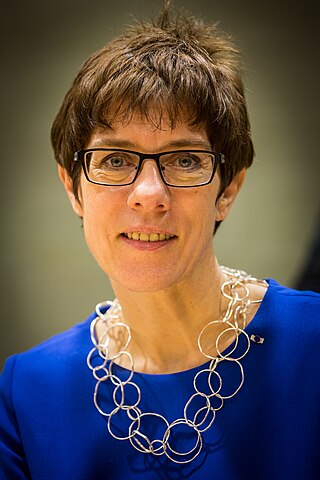
The 2017 Saarland state election was held on 26 March 2017 to elect the members of the Landtag of Saarland. The incumbent grand coalition of the Christian Democratic Union (CDU) and Social Democratic Party (SPD) led by Minister-President Annegret Kramp-Karrenbauer was returned with an increased majority.

The 2017 North Rhine-Westphalia state election was held on 14 May 2017 to elect the members of the Landtag of North Rhine-Westphalia. The incumbent coalition government of the Social Democratic Party (SPD) and The Greens led by Minister-President Hannelore Kraft was defeated. The Christian Democratic Union (CDU) became the largest party and formed a coalition with the Free Democratic Party (FDP). CDU leader Armin Laschet was subsequently elected Minister-President.

The 2019 Thuringian state election was held on 27 October 2019 to elect the members of the 7th Landtag of Thuringia. The outgoing government was a coalition consisting of The Left, the Social Democratic Party (SPD), and The Greens, led by Minister-President Bodo Ramelow.
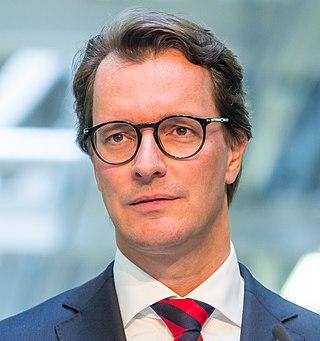
The 2022 North Rhine-Westphalia state election was held on 15 May 2022 to elect the 18th Landtag of North Rhine-Westphalia. The outgoing government was a coalition of the Christian Democratic Union (CDU) and Free Democratic Party (FDP) led by Minister-President Hendrik Wüst.

In Germany's federal electoral system, a single party or parliamentary group rarely wins an absolute majority of seats in the Bundestag, and thus coalition governments, rather than single-party governments, are the usually expected outcome of a German election. As German political parties are often associated with particular colors, coalitions are frequently given nicknames based on the colors included. Prominent political parties in Germany are the CDU/CSU (black), the SPD (red), the Greens (green), the Left, the AfD (blue), and the FDP (yellow).

Joachim Stamp is a German politician of the Free Democratic Party (FDP) who served as a member of the State Parliament of North Rhine-Westphalia from the 2012 elections to 2022. He served as Deputy Minister President of North Rhine-Westphalia from 2017 to 2022. Since 2023. he was serving as Special representative of the Federal Government for Migration Agreements.

The Laschet cabinet was the state government of North Rhine-Westphalia between 2017 and 2021, sworn in on 30 June 2017 after Armin Laschet was elected as Minister-President of North Rhine-Westphalia by the members of the Landtag of North Rhine-Westphalia. It was the 24th Cabinet of North Rhine-Westphalia.

The second Wüst cabinet is the current state government of North Rhine-Westphalia, sworn in on 29 June 2022 after Hendrik Wüst was elected as Minister-President of North Rhine-Westphalia by the members of the Landtag of North Rhine-Westphalia. It is the 26th Cabinet of North Rhine-Westphalia.



